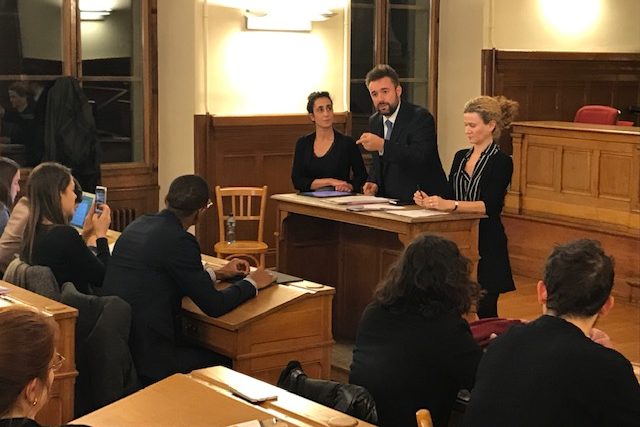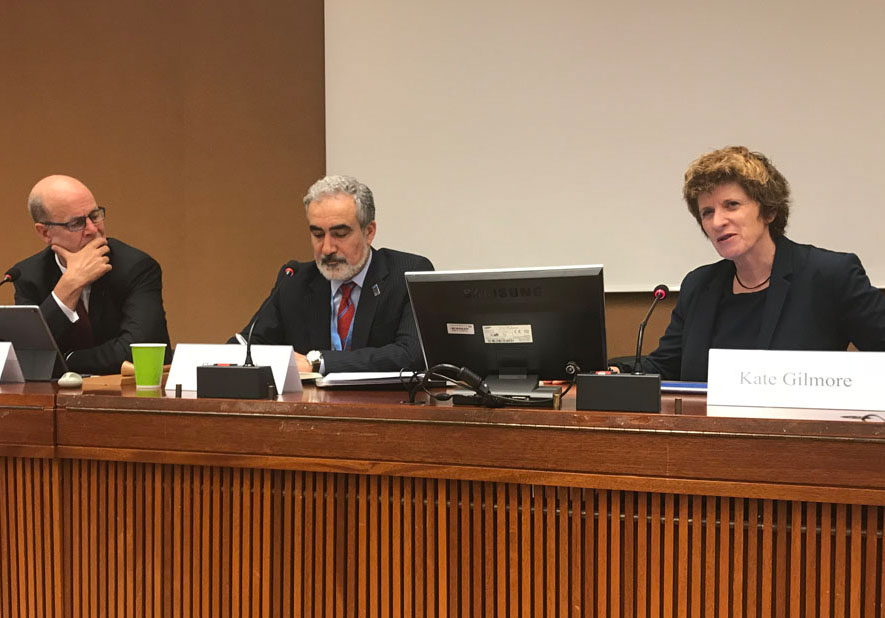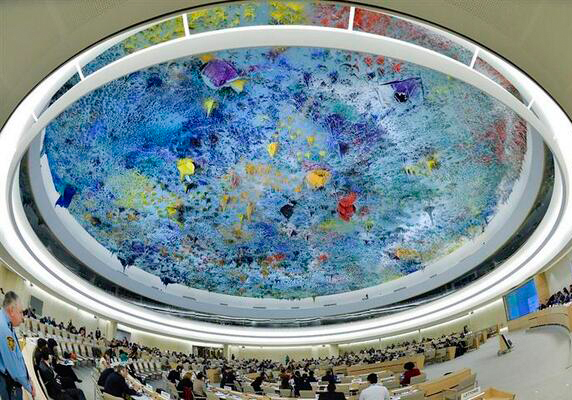
Dec 10, 2019 | News
Part of the active ‘International Cooperation Initiative’ between the ICJ and the Geneva Bar Association, a full house conference, attended by Geneva Lawyers, took place tonight at the Palais de Justice of Geneva. The theme was the criminalization of helping migrants for humanitarian motives.
Massimo Frigo, Senior Legal Adviser of the ICJ’s Europe and Central Asia Programme presented this complex issue with regard to the existing protocols of European directives and the reluctance of EU states to respect them.
The conference Le délit de solidarité en droit Suisse, européen et mondial was the first of many collaborations to come on subjects of common interest between the ICJ and the Geneva legal community.

May 3, 2018 | Feature articles, News
On 3 and 4 May 2018, the ICJ supported by UNAIDS and OHCHR convened an expert meeting on global principles addressing criminalization’s detrimental impact in the areas of sexuality, reproduction, drug use and HIV.
The expert meeting of leading jurists from around the globe aimed at laying the foundations for a set of principles to address the misuse and abuse of the criminal law and its detrimental impact on health, equality and human rights.
The expert group focused on the criminalization of conduct relating to four principal areas: sexuality, reproduction, personal drug use, and the overly broad criminalization of HIV exposure, transmission and non-disclosure.
In these areas, international human rights authorities, as well as domestic courts, have regularly found criminal law provisions to be contrary to international law and standards, and to have a deleterious effect on public health.
“We need to understand why the blunt instrument of the criminal law is used against and affects real people, and why the criminal law ought not to apply in our four areas of concern. Where the criminal law is misused, that is a betrayal of the rule of law. The rule of law must be our guiding compass,” said Justice Cameron, Constitutional Court of South Africa.
“The principles we hope to develop must facilitate the availability of tools which can impact key populations where they are in conflict with the law. They are often at risk of blackmail, stigma and discrimination. It falls on courts to make the difficult decisions. Judges can then consider legality, legitimate purpose and questions of necessity and proportionality in light of a broader understanding of the human rights principles at stake and the relevant scientific evidence,” said Judge Mbaru, Industrial Court of Kenya.
“The law is required to guarantee rights but at same time it can impose arbitrary restrictions. Often those restrictions in the form of the criminal law purport to be necessary in order to ‘protect’ people. That purported purpose ought to be closely scrutinised,” said Justice Ortiz, Constitutional Court of Columbia.
Sam Zarifi, Secretary General of the ICJ, stated: “The misuse of the criminal law affects the most marginalized groups of people and, in particular, the dispossessed and disenfranchised.”
“The centrality of the rule of law at a time when it is under threat globally, and our crucial obligation to stand against laws that are arbitrary, unequal and discriminatory,” he added.
Tim Martineau, Acting Deputy Executive Director of UNAIDS said: “The application of human rights principles to criminal law is key in order to address the detrimental impact of such laws in the areas of sexuality, reproduction, drug use and HIV.”
“While there was significant progress in HIV prevention, treatment and care, there was a big discrepancy in HIV prevention in relation to key populations who are more vulnerable to HIV infection in many respects because of a lack of legal protection, and the unjust criminalization of their behaviour,” he added.
Kate Gilmore, Deputy High Commissioner for Human Rights, stated that the criminal law can readily become a tool of repression or oppression. She said: “Wrongful deployment of criminal law betrays universal human rights standards. By eroding rather than protecting physical and mental integrity specifically in the contexts of sexuality, reproduction and gender identity, misuse of criminal law seeks a wrongful “regulation” of the body of women in particular, with devastating consequences for women’s and girls’ autonomy, health and well being.”
She emphasized that “the criminal law plays an essential role in the recognition, protection and enforcement of rights including by tackling impunity for violations for those rights.”
ICJ, UNAIDS and OHCHR consider that the envisaged principles will help legislators, judges and advocates in the development and review of criminal laws that have adverse consequences on health, equality and human rights particularly where they relate to key populations.

Sep 11, 2017 | Advocacy, Non-legal submissions
The ICJ today delivered an oral statement at the UN Human Rights Council, on the need for criminalisation and other effective measures against enforced disappearances in Asia.
The statement, which was delivered in an interactive dialogue with the Working Group on Enforced or Involuntary Disappearances, read as follows:
“Mr President,
The ICJ echoes the Working Group’s recommendation that States should criminalize all acts of enforced disappearance, including enforced disappearances of migrants, which should be punished by appropriate penalties, taking into account their extreme seriousness.
As noted in the recent ICJ publication, “No more ‘missing persons’: the criminalization of enforced disappearance in South Asia”, despite the region having some of the highest numbers of reported cases of disappearances in the world, enforced disappearance is not presently a distinct crime in any South Asian country.
This is a major obstacle to ensuring justice in cases of enforced disappearance.
In Southeast Asia, the ICJ has highlighted the failure of authorities to effectively investigate cases of alleged enforced disappearance in the absence of national laws criminalizing enforced disappearance, for example with respect to emblematic cases of Sombath Somphone in Lao PDR and Somchai Neelapaijit and Porlajee “Billy” Rakchongcharoen in Thailand.
Where there is no clear national legal framework specifically criminalizing enforced disappearance, unacknowledged detentions by law enforcement agencies are often treated by national authorities as “missing persons” cases.
On rare occasions where criminal complaints are registered against alleged perpetrators, complainants are forced to categorize the crime as “abduction”, “kidnapping” or “unlawful confinement”.
These categories do not recognize the complexity and the particularly serious nature of enforced disappearance, and often do not provide for penalties commensurate to the gravity of the crime.
They also fail to recognize as victims relatives of the “disappeared” person and others suffering harm as a result of the enforced disappearance, as required under international law.
Finally, the ICJ welcomes the Working Group’s migration study; we note that the ICJ Principles on the Role of Judges & Lawyers in relation to Refugees and Migrants, published earlier this year, includes key safeguards that could help prevent disppearances in this context.
Thank you.”
The statement is available in PDF format in English, in Thai and Laotian.







